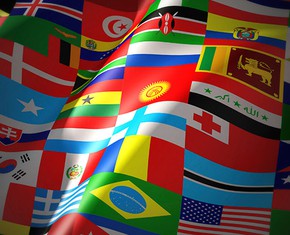The views expressed in our content reflect individual perspectives and do not represent the authoritative views of the Baha'i Faith.
The merging of all nations into one global civilization is not some vague idealistic hope—it’s a fact of life in the 21st century.
In the past, we might have said: “Over there is Islamic civilization,” “Over here is Chinese civilization,” “These regions here belong to European civilization,” etc. Now these categories have become hazy, intermixed, polyglot. No culture or civilization represents only one ethnicity, background or racial group today.
More in keeping with real conditions on the ground, everyone everywhere participates in the emergence of a global civilization—although some aspects of it have developed more than others. For example, we see it most in the world’s economy. But we have also integrated at a global level within the arts, science, language, politics, religion, and education.
So who does this process of globalization belong to? Who should claim this emerging world civilization as theirs?
Some say it belongs to the Western countries, largely because technology, languages, fashion, and ideologies disseminating from Europe, North America and Japan have given the most tangible expression to modern globalization. Others say it belongs to the superrich, who are accumulating massive fortunes—while others barely keep up—by exploiting the supply chains, trade routes, and capital flows that now link each continent to the other. Then there are those who say it belongs to cultural elites who are biased in favor of immigration, cosmopolitanism, and multiculturalism, and who gladly impose their values on the less educated.
Whichever of these accounts or others you may be inclined to believe, the common pattern connecting them suggests that those on the inside have control, and those on the outside must accept the path traced out by others, regardless of its negative impact on their lives. This perception, and the reality that goes along with it, obviously causes pain, resentment, and difficulty.
However—the Baha’i teachings say that the emerging world civilization belongs to everyone, not just one privileged portion of humanity, and that the principle of the oneness of humanity forms its spiritual basis. This principle is the foremost teaching of Baha’u’llah, the 19th century founder of the Baha’i Faith, whose teachings can provide a spiritual and moral framework for this budding world society. In his writings he stated:
Turn your faces from the darkness of estrangement to the effulgent light of the daystar of unity. This is that which above all else will benefit the peoples of the earth. O friend! Upon the tree of utterance there hath never been, nor shall there ever be, a fairer leaf, and beneath the ocean of knowledge no pearl more wondrous can ever be found. – Baha’u’llah, The Tabernacle of Unity, p. 7.
The development of a world civilization has become a tangible, observable reality, not some esoteric doctrine contained only in holy books. For that reason, anyone with eyes to see and ears to hear can have insight into the process of global unification.
Baha’is, even as they support the unification of the world, can claim no exclusive knowledge of how it works. The Baha’i teachings can spark ideas into how to live our lives and care for our souls within the context of world unification, but the Baha’i teachings don’t dictate very many specific conditions. This is all the more reason for Baha’is to be humble in their engagement with others. In 2013, the Universal House of Justice, the international governing body of the Baha’i Faith, had this to say on the construction of a world civilization.
… Baha’is do not believe the transformation thus envisioned will come about exclusively through their own efforts. Nor are they trying to create a movement that would seek to impose on society their vision of the future. Every nation and every group—indeed, every individual—will, to a greater or lesser degree, contribute to the emergence of the world civilization towards which humanity is irresistibly moving. Unity will progressively be achieved, as foreshadowed by Abdu’l-Baha, in different realms of social existence, for instance, “unity in the political realm”, “unity of thought in world undertakings”, “unity of races” and the “unity of nations”. As these come to be realized, the structures of a politically united world, which respects the full diversity of culture and provides channels for the expression of dignity and honour, will gradually take shape. – The Universal House of Justice, 2 March 2013, To the Baha’is of Iran.
Baha’is do not have a monopoly of insight into humanity’s process of unification, but Baha’is do believe that through the revelation of the Baha’i teachings, God has recast religion in a form befitting the global society now taking shape. These teachings are a gift humbly offered to the world. They are not an ultimatum.
If someone is not a Baha’i, that doesn’t mean that they have nothing to contribute, practically or intellectually, to the global civilization prophesied by Baha’u’llah. We can all develop the capacity to thoughtfully observe the present state of humanity and take practical steps to carry us forward.
The new world order promised by Baha’u’llah, which will come together in the fullness of time, belongs to everyone. For that reason, Baha’is seek to collaborate with anyone, regardless of religious affiliation or lack thereof, in their efforts to contribute to the constructive and unifying forces at work in our communities.
We have been created for oneness. In oneness, we must assume ownership for our future upon this Earth.
















Comments
Sign in or create an account
Continue with Googleor